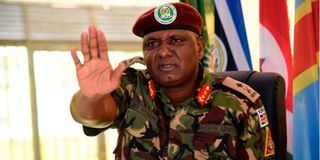EAC defends regional force sent to restore peace in DRC

Major General Jeff Nyagah, the commander of the East African Community Regional Force (EACRF) who has left the mission area in DR Congo. PHOTO | EVANS HABIL | NMG PHOTO FILE
What you need to know:
- The regional organisation brushed aside a barrage of criticisms of the joint force, saying it has restored peace and stability there
Arusha. The East African Community (EAC) has finally come out to defend the regional force sent to the troubled eastern DR Congo.
The regional organisation brushed aside a barrage of criticisms of the joint force, saying it has restored peace and stability there.
A terse statement from the secretariat apparently came in response to conflicting reports on the status of the East African Community Regional Force (EACRF).
Military contingents from Kenya, Burundi, Uganda and South Sudan were sent there in the wake of increased insurgency by rebel groups in North Kivu.
Almost six months after their deployment, the troops have occasionally been criticised by some Congolese for their failure to halt the killings.
However, the EAC said in a statement seen by The Citizen that contrary to the thinking of others, the force has made "tremendous progress".
"The EACRF has made tremendous progress in its efforts to restore peace and stability in eastern DRC as envisaged by the regional leaders,” it said.
The joint force has also continued to ensure observance of the ceasefire "in addition to overseeing the withdrawal of armed groups who have handed over to EACRF most of the areas that were under their control".
The decision to expeditiously deploy a joint regional force to the besieged territory was made during the EAC leaders' summit in Arusha in July last year.
Its mission was to restore peace and security following renewed violence from various armed groups, including the dreaded M23. The EAC insisted that there were some areas in the troubled eastern edge of the vast DR Congo that were once in the hands of the rebels but now under the regional force.
These include Karuba, Mushaki, Kiloriwe, Kitchange, Mweso, Kishishe, Bambo, Mnagana, Tchengerero, Kiwanja and Kinyandoni.
The said areas have since been under the control of various EACRF contingents "which will now enable residents to return to their homes and businesses".
The Arusha-based regional body said it was proud of the work that has so far been accomplished by the EACRF "towards restoration of peace and security in the eastern DRC".
The statement added that the Community was fully committed to ensure restoration of peace and stability there as directed by the regional leaders.
The EAC dispatch did not say anything about the Commander of the regional force Major General Jeff Nyagah from Kenya who exited last week.
General Nyagah was quoted by the regional and international media outlets as having been forced to bow out over his personal security.
He charges that there had been a well- orchestrated negative media campaign against him and his contingents.
These, according to him, included “direct written false accusations of EACRF’s complacency on the handling of the M23 group.”
Nyagah stated that his former residence in Goma was subjected to an attempt to intimidate his security by deploying foreign military contractors (mercenaries).
Kenya government has not responded to the allegations and upon his return to Nairobi, General Nyagah was appointed to head the Western Command of the Kenya Defence Forces (KDF).
Instead, the Kenyan government appointed Major General Alphaxard Muthuru Kiugu as the new EACRF Commander to replace General Nyagah.
Although Nairobi has played down reasons for Nyagah's exit, the issue has generated debate on the DR Congo's conflict which continues to rope in interests from various corners.
For instance, it was unclear who the “foreign military contractors (mercenaries)” Nyagah referred to were.
But when a team of journalists toured EACRF operational areas last week, they were visible patrolling the area in their pick-up trucks.
Russian mercenaries, Wagner Group, had been fingered before by Washington, as contributing to DRC’s instability. Nyagah did not directly accuse them.
His exit marks another controversy on the EACRF.
Since the regional force was deployed in November last year, the Congolese government has often demanded that it targets the M23, which Kinshasa labels a “terrorist group.”
Several protest marches were organised in January in Goma and other cities against the "inaction" of the regional force.
Kinshasa did not like the idea that the EACRF was a buffer force, playing military diplomacy while political leaders influence dialogue.
In February in Bujumbura, President Félix Tshisekedi had reproached Nyagah in front of President William Ruto, asking the EACRF chief "not to help the M23".
"You are not there to help the M23," Tshisekedi said.
On several occasions, Maj-Gen Nyagah said the mission of the regional force was not only against the M23, but against all armed groups that infest eastern DR Congo, contradicting the Congolese authorities who want to focus on the M23.
But observers in Arusha often hinted that the mandate of the EACRF was not made clear from the beginning.
He said in the eyes of many people in East Africa, the joint force was expected to quell the insurgency in the restive region.
However, he said the force has remained unpopular in Congo due to its apparent failure to disarm the rebels and protect the innocent civilians.



